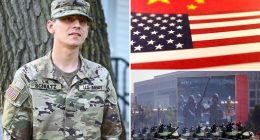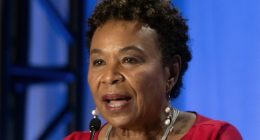There were also pledges to develop a peacekeeping partnership, work closely on fighting cyber and transnational crime and develop education ties.

On climate change, Australia promised $105 million towards sustainable infrastructure planning, private investment in clean energy and technical assistance to the critical minerals sector.
Vietnam Prime Minister Pham Minh Chinh described the relationship between the two countries as “flourishing” while Albanese called the nation an “important friend”, half a decade on from the Vietnam War.
“Building upon the accomplishments of 50 years of excellent bilateral relations, Vietnam stands ready to accompany Australia in a new phase of cooperation, elevating our strategic partnership to a new height, with greater substance for the benefit of our two peoples and for peace, stability, cooperation and development in the region and the world,” Pham said.
President Vuong Dinh Hue said the visit would make “meaningful contributions to further strengthening the strategic partnership”.
Albanese addressed a business exchange at the Australian embassy on Saturday night.
“I discussed with businesses there the opportunity for a linkage between our educational exchanges, and the needs that our economy has,” he said on Sunday.

“We know in areas like aged care, for example, there is an opportunity for greater exchange and greater support.
“We want to make sure that when we look at our immigration, that we get the right people in the right places with the right skills, so that focus is on the need of Australia.
“We know that in some of the areas where there are skill shortages, then Vietnam can be of great assistance.”
Albanese also met with the president of the National Assembly, and the general secretary of the Communist Party on a busy visit that included a media stop with the Young Matildas soccer team in between Asian Cup qualifiers.
Read Related Also: Pete Alonso’s four-game homer tear gives life to Mets lineup
The Vietnam visit came amid tensions in the region over the South China Sea and Beijing’s boisterous rhetoric over Taiwan.
“Conflict is neither imminent nor inevitable. Deterrence is strong today – and it’s our job to keep it that way,” Austin said.
“The whole world has a stake in maintaining peace and stability in the Taiwan Strait.
“The security of commercial shipping lanes and global supply chains depends on it.
“And so does freedom of navigation worldwide. Make no mistake: conflict in the Taiwan Strait would be devastating.”

Asked about reports of a Chinese warship cutting across the bow of an American destroyer, Albanese repeated comments about the need for engagement, dialogue and the need to follow international rules.
“These issues are of concern. I spoke there about a misadventure or a miscalculation having consequences,” he said, referring to his own Shangri-La Dialogue remarks.
“We need to make sure that the UN Convention on the Law of the Sea applies.
“We need to make sure that all operations, maritime and aviation in the region are able to operate safely.”

Chinese fighter jet confronts US Navy plane over disputed sea








